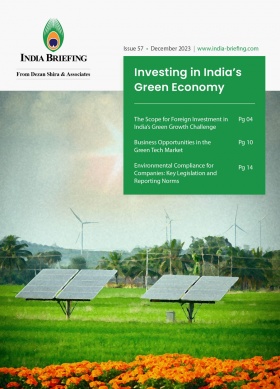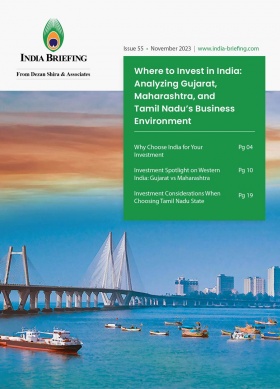India’s Stock Market Expected to Reach US$10 Trillion Market Value by 2030
India’s growing market capitalization, reaching US$4,574.606 billion in January 2024, signals its emergence as a top destination for global investments. Analysts project that India’s domestic stock market could command a market capitalization of US$10 trillion by 2030 on the back of a strong economy, favorable demographics, and institutional improvements.
India’s current market capitalization size
India’s stock market is currently the fifth largest in the world, and is expected to reach US$10 trillion in market size by 2030. Global brokerage firm Jefferies claims that there are many possibilities available to investors in the corporate sector that focus on return on equity (RoE), which includes 167 businesses with a market value of over US$5 billion.
An estimation of the growth forecast can also be made using the country’s stock market’s performance from January 2023 to the present. India briefly surpassed Hong Kong to become the world’s fourth-largest equities market for the first time. According to a January 2024 Bloomberg report, the aggregate value of shares listed on Indian exchanges was US$4.33 trillion, while Hong Kong’s share value was US$4.29 trillion.
India first achieved the US$1 trillion milestone on May 28, 2007; however, it took another decade for the country to reach US$2 trillion. The subsequent milestone of US$3 trillion was reached on May 24, 2021, after a gap of just four years from its previous milestone.
India has established itself as a rival to China because of its rapid increase in equity share, drawing in new investment from both international corporations and investors. The country’s stable political system and consumption-driven economy, which continues to be among the fastest-growing among major nations, are additional factors that may have contributed to the strong performance.
In 2023, foreign portfolio investors and mutual funds injected over US$21 billion into Indian stocks, with a particular focus on midcaps and smallcaps, propelling the nation’s benchmark S&P BSE Sensex Index to a record eight consecutive years of growth.
India’s stock market remains bullish in 2023
In 2023, the Indian stock market witnessed a robust bullish trend, characterized by successive record peaks on key indices. For the current year, the outlook for the domestic stock market remains optimistic, though volatility to some degree can be expected. Various domestic and international factors are expected to impact market dynamics in 2024, leading to anticipated fluctuations and molding the overall course of the Indian stock market.
On December 5, 2023, the value of the Indian stock market surpassed US$4 trillion for the first time. Strong corporate profitability, a steadily expanding base of individual investors, consistent inflows from foreign institutional investors (FII), and solid domestic macroeconomic fundamentals all contributed to the Indian stock market’s surge.
Top 10 stock exchange operators worldwide as of January 2024, by market capitalization (in trillion U.S. dollars)
|
Ranking |
Stock exchange |
Value |
|
1 |
NYSE, United States |
24.27 |
|
2 |
NASDAQ, United States |
23.12 |
|
3 |
Euronext, Europe |
6.79 |
|
4 |
Japan Exchange Group |
6.34 |
|
5 |
Shanghai Stock Exchange, China |
6.04 |
|
6 |
National Stock Exchange of India |
4.52 |
|
7 |
Shenzhen Stock Exchange, China |
3.64 |
|
8 |
Hong Kong Exchange |
3.59 |
|
9 |
LSE Group, United Kingdom |
3.18 |
|
10 |
TMX Group, Canada |
2.88 |
Data: WFE Statistics Team
India market capitalization accounted for US$4,574.606 billion in January 2024, compared to US$4,378.993 billion in the previous month. As of December 2023, India’s overall market capitalization had gained 8.82 percent, the highest growth among the top 10 markets.
Will India’s stock exchange reach a double-digit mark by 2044?
National Stock Exchange (NSE) CEO Ashish Chauhan predicts India’s market capitalization may reach up to US$50 trillion in the next 20 years. Goel credits stockbrokers as a catalyst for this growth and has claimed that almost 90 million depositories with unique PAN numbers are registered with the NSE, which accounts for 20 percent of India’s households. He affirmed his stance that the nation must set a target to make it 100 percent in the coming years.
What is the GIFT Connect?
GIFT Connect represents the first cross-border initiative linking Singapore and India’s capital markets.
In January 2024, Boon Chye Loh, the CEO of the Singapore Stock Exchange (SGX), praised SGX Group’s most significant initiatives, particularly the completion of the NSE IX-SGX GIFT Connect. The GIFT Connect became fully operational by July 2023, boasting US$9 billion in open interest in Nifty futures and options.
Describing it as a pivotal four-year collaboration between SGX Group and the National Stock Exchange of India (NSE), Boon emphasized that the partnership pioneered a novel trading and clearing model. He added that it successfully brought together regulators from Singapore and India, navigated regulatory complexities, and established a robust infrastructure that redefined India’s accessibility for both onshore and offshore market participants.
Boon highlighted that with GIFT Connect, the complexities of cross-border trading have been simplified, presenting numerous opportunities for international investors to tap into one of the world’s fastest-growing economies. It serves as evidence of the transformative power of exchange alliances, ushering in a new era of accessibility for global investors.
NSE IFSC Limited (NSE International Exchange) (NSE IX) was established on November 29, 2016. It operates as a wholly-owned subsidiary of the National Stock Exchange of India Limited (NSE) and has obtained approval from the Securities and Exchange Board of India (SEBI) to set up an international exchange within the Gujarat International Finance Tech City (GIFT) – International Financial Service Centre (IFSC) in Gandhinagar. GIFT city, designated as a special economic zone, is India’s first IFSC. Stock exchanges that operate in the GIFT IFSC are permitted to offer trading in securities in any currency other than the Indian rupee.
The GIFT Connect brings together international and onshore GIFT participants to create a bigger liquidity pool for Nifty products on NSE IFSC, as explained on the SGX website. GIFT Nifty, was formerly the SGX Nifty, and a key indicator for India’s domestic stock market indices. Trading under its new name since July 3, 2021, GIFT Nifty operates in two sessions, spanning from 4:30 am to 2:00 pm IST and 3:30pm to 11:30 pm IST, aligning with international market timings.
What is market capitalization?
A group of exchanges for publicly traded companies makes up the stock market. Investors purchase and sell shares on these exchanges. One of the most interesting features of this heavily controlled system is that the stock exchanges are also considered the financial indicators of an economy, with the index reflecting industrial development and firmness.
Right now, the New York Stock Exchange and the NASDAQ are the biggest stock markets in the United States. These markets seek to establish what is referred to as a free market, which enables traders to exchange capital and make investments with a range of enterprises. The stock exchange allows participation from a large number of nations worldwide. The US accounts for the most investors; US citizens make up about 58 percent of the country’s stock market participants.
Outlook
By 2030, market analysts predict that India will surpass Germany and Japan as the fastest growing large economy due to favorable demographic factors (a steady supply of labor), strengthening institutional foundations, and better governance. India is the sixth-largest stock market, but it ranks eighth in the Bloomberg World Index with a weight of just 2 percent, suggesting that there is still opportunity for foreign institutional investors to start adding more dollars. The GIFT IFSC aims to boost such opportunities.
About us
India Briefing is produced by Dezan Shira & Associates. The firm assists foreign investors throughout Asia from offices across the world, including in Delhi and Mumbai. Readers may write to india@dezshira.com for more support on doing business in India.
We also maintain offices or have alliance partners assisting foreign investors in Indonesia, Singapore, Vietnam, Philippines, Malaysia, Thailand, Bangladesh, Italy, Germany, Australia, and the United States.
- Previous Article Outlook for Sovereign Wealth Fund Investments in India
- Next Article Risks for US Businesses in Emerging Asian Markets in 2024









